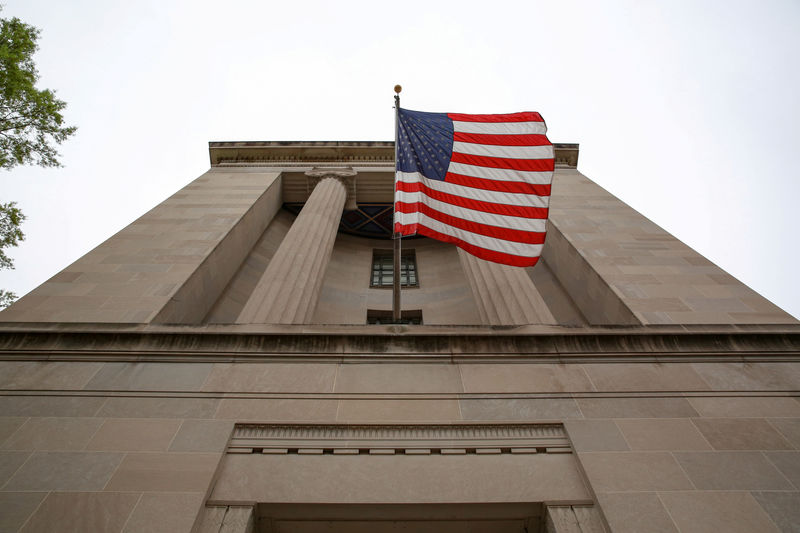By Sarah N. Lynch
WASHINGTON (Reuters) - A unit of the largest U.S. public employees union has filed a complaint with the Justice Department’s Inspector General alleging that an appointee of President Donald Trump may be improperly using political criteria gleaned from social media to remove people who have expressed views contrary to Trump's from participating in the process of awarding grants to organizations that provide services to victims of crime.
The confidential complaint focuses on Darlene Hutchinson Biehl, a Republican from Alabama, according to a union official who described it to Reuters.
Hutchinson Biehl was appointed by Trump in 2017 as director of the Office for Victims of Crime (OVC), a part of the Justice Department which compensates victims of crime and awards grants to local governments, nonprofits and other organizations that assist victims of crimes such as human trafficking. Most of the money for the grants comes from funds collected from convicted felons, although grants to help provide services to human trafficking victims come from taxpayer funds.
The complaint alleges that Hutchinson Biehl has been scrutinizing the social media accounts of peer reviewers – paid experts who make non-binding recommendations to help ensure that the competitive grants are awarded in a fair and impartial manner - to see if their views were aligned with the Trump administration’s policies on immigration, or if they openly supported the legalization of prostitution. Hutchinson Biehl is then using that information to determine who should serve as reviewer, according to the complaint.
The American Federation of State, County and Municipal Employees (AFSCME) Local 2830, which represents employees inside the Office of Justice Programs, filed its complaint on Aug. 16 and asked for an investigation into the matter. The complaint also raises concerns about the grant peer review process in one other Justice Department office.
The complaint includes copies of internal documents showing lists of peer reviewers' names with a column next to each in which Hutchinson Biehl made notes showing she had looked up people's profiles on LinkedIn (NYSE:LNKD) and Twitter, according to the union official. Some employees believe the rejection of some peer reviewers was primarily based on views expressed on social media, the complaint alleges.
"While the union cannot say with certainty that anyone was not selected as a peer reviewer because their views did not align with President Trump, we have received strong evidence that this may be the case," said Marilyn Moses, president of the AFSCME Local 2830, who described the complaint to Reuters.
Reuters could not determine whether the peer reviewers whom Hutchinson Biehl excluded had made posts on social media expressing their views on immigration or prostitution.
Hutchinson Biehl declined to comment.
A Justice Department official who spoke on condition of anonymity said Hutchinson Biehl is screening peer reviewers and occasionally looking at social media profiles, but denied that she was making politically motivated decisions.
"Her focus is on ensuring that every peer reviewer has the appropriate expertise to review the grant," said the official.
The official acknowledged that Hutchinson Biehl has struck about 20 resumes out of hundreds of reviewers, though some of those people were still able to serve on other panels to review grant applications.
Hutchinson Biehl is justified in looking into people’s views on prostitution, the official said, because the law that funds the human trafficking grants bans recipients from using the money to lobby for or promote the legalization of prostitution.
However, peer reviewers themselves do not receive grant funds. The Justice Department official declined to comment further.
Democrats on the House of Representatives Judiciary Committee said in a post on Twitter that the "disturbing allegations" made in the complaint deserve thorough investigation by the Justice Department's Inspector General.
"Applicants should be judged by adherence to professional standards, not political views," the post said.
Trump has not made any public policy statements regarding prostitution, but under his administration the Justice Department has strictly enforced a policy that no federal grants will be made to groups that "promote, support, or advocate the legalization or practice of prostitution."
Peer reviewers' names are not made public by the Justice Department, and Moses declined to identify any names of reviewers contained in the complaint.
The internal Justice Department policy on peer review selection does not explicitly address the kinds of concerns raised by the union in its complaint, according to a copy of the policy seen by Reuters, and the director ultimately gets to decide how grants are awarded. A spokesman for the Justice Department Inspector General declined comment.
Current and former Justice Department officials say that historically, the OVC director has not been actively involved in the final stage of selecting peer reviewers in order to ensure the process remains non-partisan.
"I never once in 10 years selected a peer reviewer," said Laurie Robinson, the former assistant attorney general of the Office of Justice Programs, of which OVC is a part. "That is how it should be – that the person who signs grants is not involved in selecting peer reviewers."

In fiscal year 2018, the OVC awarded nearly $3.8 billion in grants, of which $313 million involved competitive grants that are examined by peer reviewers.